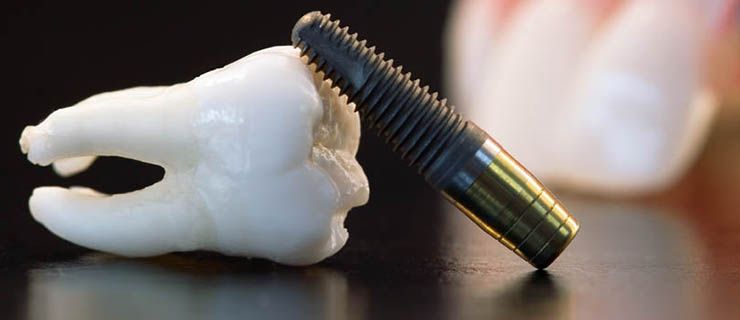Loosing our teeth for any reason may cause serious trauma. The fixed or removable partial dentures used to replace teeth are rather uncomfortable and aesthetically inadequate for many pepople. For them, a dental implant can be the solution.

Forty years ago, the Swedish Professor Per Ingvar Branemark realized that the titanium-based metal plates - which were commonly used for animal experiments that time - have a very special feature: the bones are able to coalesce to them. This discovery marked the beginning of a new era in medical science. Since then, the titanium is used in joint surgery; for joining broken bones, for replacement of lost tissue, for restoring the shape, and last but not least, for dental implantation. Titanium can connect the molecules of water, sodium, calcium, chlorine, phosphate to itself, to which later the protein structures of the bone tissue will be able to bond. To be more specific, implantation is not tooth, but in fact the placement of an artificial root in the jaw bone. The most commonly used are the so-called screw implants, the insertion of them is not too complicated, but requires accurate preparations, full attention and professional skills.
Before the intervention the dentist or the oral surgeon makes a health-check, in other words he examines the anatomical condition, asks for laboratory tests as well, focusing mainly on the datas of blood coagulation and blood glucose. Dental implant requires good general health condition, bone height and bone thickness. The compliance of bone thickness is examined by taking of X-ray radiograms. The doctor will also gather information about the patients eating and smoking habits, which is important in the aspects of the healing period after the operation. The number and placement of artificial roots depends on how many teeth need to be treated. In case of a complete edentulousness, the placement of 6 implants in the lower jaw, and 7-8 implants in the upper jaw is necessary, which will be complemented with the specially designed denture after 4 months.
Dental implants are applicable at almost every age for patients who are missing just one permanent teeth or completely edentulous. The practice shows that the placement of titanium-implants significantly decreases the atrophy of alveolar jaw bone, therefore the replacement of the lost tooth or teeth is to be done as soon as possible. The implantation can also serve as replacement of tooth broken in accident, if the adjoining tooth is not damaged and the patient does not want to have it burnished. Implant can be the solution for smaller bridges, if the teeth around the missing one(s) are intact, or the abutment teeth are missing.
The operation can be done under local anaesthesia, so the process is almost painless, the inconvenience of the patient is not more than in case of a simple tooth extraction. In some clinics, when inserting more roots in the jaw, general anaesthesia is applied. Some bulges or pain might occur after the intervetion, but it can be treated with medicines. Long-term succes can not be achieved without following and keeping the strict rules of oral hygiene. Implants are bound more strongly to the jawbone as natural teeth, but their connection with the gums is much weaker. Consequently, inadequate dental and oral hygiene can cause more harm around the implant. Howewer, if the patient follows the rules, implant can last up to a lifetime.
SINUS LIFT: is a routinely applied surgical procedure nowadays, which main point is to thicken the atrophied part of the upper jaw bone (maxilla processus alveolarisa) towards the maxillary sinus (sinus maxillaris) using bone graft or bone substitute, this way adapting that in appropriate condition for inserting implants.
BONE REPLACEMENT is necessary, in cases, where the bone is not thick enough to carry implant. Materials used in bone grafting can be the patients own bone (autograft) or artifically prepared bone substitute. The procedure ist feasible both on the upper and lower jaw bone as well.